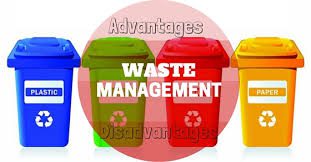Would you like to discover the benefits of effective waste management? This brief guide has you covered. Waste management is a crucial process that brings about numerous benefits to our environment, health, and overall quality of life.
It involves the collection, transportation, processing, and disposal of waste materials. Here are some of the key benefits of effective waste management:
1. Environmental Preservation: Waste management helps safeguard our environment by reducing pollution and preventing the release of harmful substances into the air, soil, and water. Proper disposal methods minimize the risk of contamination and protect ecosystems.
2. Resource Conservation: Through recycling and waste-to-energy technologies, waste management allows us to recover valuable resources from waste materials. This not only reduces the strain on natural resources but also promotes sustainable practices.
3. Improved Public Health: Effective waste management reduces health hazards associated with improper waste disposal. It helps control the spread of diseases, as pests and pathogens are less likely to thrive in well-managed waste systems.
4. Reduced Landfill Usage: By recycling and composting, we can significantly reduce the amount of waste sent to landfills. This extends the lifespan of existing landfills and minimizes the need to create new ones, which can be costly and environmentally damaging.
5. Energy Generation: Waste-to-energy facilities can convert waste into electricity or heat, contributing to the generation of clean and renewable energy. This reduces the reliance on fossil fuels and decreases greenhouse gas emissions.
6. Economic Benefits: A well-organized waste management system can create job opportunities in collection, recycling, and waste processing sectors. Additionally, it can attract investments in recycling and waste-to-energy infrastructure, stimulating local economies.
7. Community Aesthetics: Clean streets and neighborhoods enhance the overall quality of life for residents. Effective waste management promotes cleanliness and aesthetics, making communities more attractive and pleasant places to live.
8. Compliance with Regulations: Adhering to waste management regulations and practices ensures that businesses and individuals avoid fines and legal penalties. This fosters responsible waste disposal and environmental stewardship.
9. Long-Term Sustainability: Sustainable waste management practices are essential for the well-being of current and future generations. By managing waste wisely, we contribute to a cleaner, healthier planet for our children and grandchildren.
Waste management plays a vital role in protecting our environment, conserving resources, improving public health, and supporting economic growth. Embracing responsible waste disposal practices is not only beneficial for individuals and communities but also essential for the long-term sustainability of our planet.
Read Also: How to Make Money using Sa Recycling Company
Waste Management Process

Waste management is a systematic process that helps keep our surroundings clean, protects the environment, and promotes health. Here is a simple guide to the waste management process:
1. Waste Generation: It all begins with the creation of waste. This can be from homes, businesses, industries, or other sources. Waste comes in various forms, including solid, liquid, and hazardous materials.
2. Collection: After waste is generated, it needs to be collected and transported to a central location. This step involves using bins, dumpsters, or specialized vehicles to gather waste from homes and businesses.
3. Segregation: Once collected, waste is sorted into different categories. This separation helps identify recyclables, organic waste (like food scraps), and non-recyclables. Segregation ensures that each type of waste is managed appropriately.
4. Transportation: Waste is then transported to facilities where it will undergo various processes. Specialized trucks are used to move waste to recycling centers, composting sites, or waste-to-energy plants.
5. Processing and Treatment: Recyclable materials like paper, cardboard, plastic, and glass are processed to create new products. This reduces the need for virgin resources and conserves energy.
6. Monitoring and Regulation: Government agencies and environmental organizations oversee waste management processes to ensure they meet safety and environmental standards. They also create regulations and guidelines for waste handling and disposal.
7. Education and Awareness: Public education plays a crucial role. People need to know how to dispose of waste properly, recycle, and reduce waste generation. This helps improve the effectiveness of waste management efforts.
8. Innovation and Technology: Advances in technology continue to improve waste management. New methods for recycling, waste-to-energy conversion, and waste reduction are continually being developed.
9. Reuse: Before waste is discarded, efforts are made to find ways to reuse items. This reduces waste and conserves resources.
10. Sustainable Practices: Sustainable waste management focuses on reducing waste generation at the source, encouraging recycling and reuse, and minimizing the environmental impact of waste disposal.
Waste management is a comprehensive process that involves collecting, sorting, processing, and disposing of waste in an environmentally responsible manner. It not only keeps our communities clean but also contributes to resource conservation and a healthier planet. Active participation and awareness from individuals, businesses, and governments are essential to making waste management processes efficient and sustainable.
The Pros and Cons of Waste Management
Waste management has its benefits, but it also comes with challenges. Here’s a simple breakdown of the advantages and disadvantages of waste management:
Advantages of Waste Management
1. Environmental Protection: Waste management helps safeguard the environment by preventing pollution. Proper disposal methods reduce the release of harmful chemicals into the air, soil, and water.
2. Resource Conservation: Recycling and waste-to-energy technologies recover valuable materials and energy from waste, reducing the need for virgin resources.
3. Health Benefits: Responsible waste management minimizes health hazards associated with improper disposal, such as disease spread and pest infestations.
4. Landfill Reduction: Effective waste management reduces the amount of waste sent to landfills, extending their lifespan and minimizing environmental impact.
5. Energy Generation: Waste-to-energy facilities convert waste into electricity or heat, contributing to renewable energy production.
6. Economic Opportunities: The waste management industry creates jobs in collection, recycling, and processing sectors, stimulating local economies.
7. Community Aesthetics: Well-managed waste systems result in cleaner and more attractive neighborhoods.
Disadvantages of Waste Management
1. Costs: Establishing and maintaining waste management infrastructure can be expensive, especially for smaller communities.
2. Environmental Impact: Some waste management methods, like incineration, can release air pollutants and greenhouse gases, contributing to climate change.
3. Limited Recycling: Not all materials are recyclable, and recycling rates can vary. This limits the extent to which waste can be diverted from landfills.
4. Technological Challenges: Effective waste management relies on advanced technology, which may not be readily available in all regions.
5. Public Awareness: Lack of awareness and improper waste disposal practices can hinder the success of waste management efforts.
6. Waste Export: Some countries export their waste to others, creating waste disposal issues for receiving nations.
7. Regulatory Compliance: Adhering to waste management regulations can be burdensome for businesses and individuals.
Waste management offers numerous advantages, including environmental protection, resource conservation, and health benefits. However, it also poses challenges like costs, environmental impact, and the need for technological advancements.
Striking a balance between efficient waste management and minimizing its disadvantages is essential for a sustainable future. Public awareness and responsible waste disposal practices play a crucial role in achieving this balance.
Read Also: A Guide on How to Manage Waste
The Benefits of Waste Management for Small Businesses

Waste management provides valuable benefits for small businesses, and here is a straightforward look at how it can benefit them:
1. Cost Savings: Proper waste management can help small businesses save money in several ways. By reducing waste generation and implementing recycling programs, they can lower disposal costs. Plus, some waste materials, like paper and cardboard, can be sold to recycling companies, providing an additional source of income.
2. Environmental Responsibility: Small businesses that prioritize waste management demonstrate their commitment to environmental responsibility. This can enhance their reputation, attract environmentally-conscious customers, and differentiate them in the market.
3. Regulatory Compliance: Complying with waste management regulations is essential for avoiding fines and legal troubles. Small businesses that follow proper waste disposal practices can avoid costly penalties.
4. Improved Efficiency: Effective waste management streamlines operations. Small businesses that organize waste collection and disposal systems efficiently can save time and reduce disruptions to their daily activities.
5. Health and Safety: Responsible waste management helps maintain a safe and healthy workplace. It reduces the risk of accidents and prevents the spread of diseases associated with improper waste handling.
6. Resource Conservation: Small businesses can benefit from resource conservation. Recycling and reusing materials reduce the need for purchasing new resources, ultimately cutting down on operational expenses.
7. Employee Morale: Employees often feel more positive about working for a company that values environmental sustainability. A commitment to responsible waste management can boost employee morale and engagement.
8. Customer Attraction: Many consumers prefer to support businesses that are environmentally conscious. Waste management practices can attract environmentally-aware customers and contribute to customer loyalty.
9. Long-Term Sustainability: Sustainable waste management practices ensure the long-term viability of small businesses. By reducing waste and conserving resources, they can maintain their operations while minimizing their impact on the environment.
10. Adaptability: Small businesses that embrace waste management are often more adaptable to changing market trends and customer demands. They can respond to increased environmental awareness and consumer preferences for sustainable practices.
In summary, waste management is not only for large corporations but also offers significant benefits to small businesses. It can lead to cost savings, regulatory compliance, improved efficiency, and enhanced reputation.
Small businesses that prioritize waste management do not only contribute to a healthier environment but also strengthen their position in the marketplace.
Read Also: Cassava Ovary: Economic Importance, Uses and By-Products

